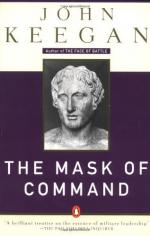
|
| Name: _________________________ | Period: ___________________ |
This quiz consists of 5 multiple choice and 5 short answer questions through Part 5.
Multiple Choice Questions
1. Wellington was eventually named the Commander-in-Chief of the British and ____________ forces, which sent him to Flanders.
(a) Dutch-Belgian.
(b) Dutch-Swedish.
(c) Dutch-Norwegian.
(d) Dutch-German.
2. Was the Blitzkrieg of Hitler's invention?
(a) Mostly.
(b) Yes.
(c) No.
(d) Not completely.
3. Alexander often used __________ to the point of detriment.
(a) Love.
(b) Fear.
(c) Hatred.
(d) Guilt.
4. Unlike ________________, Wellington rode alongside his men as they charged into battle.
(a) Grant.
(b) Alexander.
(c) Attila the Hun.
(d) Napoleon.
5. Hitler erected more than _____________ wartime lodgings.
(a) Eighteen.
(b) Twelve.
(c) Twenty.
(d) Fifteen.
Short Answer Questions
1. Chapter seven, "Hitler and the Theatre of Leadership", discusses Hitler's ________________ that he would be able to command loyalty until death from the inner sanctum at the Forbidden City.
2. In 1806, Wellington realized what dream?
3. Also included in the chapter are maps of which of Grant's conquests?
4. Even with _________________ soldiers, Darius was unable to outsmart Alexander, who perfectly executed a plan to attack Darius from the rear rather than wait to face the ruler head on at Cilicia.
5. Hitler was one of the most __________________ leaders of his or any other time.
|
This section contains 206 words (approx. 1 page at 300 words per page) |

|




